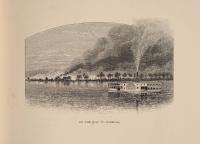 The title of the exhibition refers to Trotsky’s theory of uneven and combined development and, particularly, to its rereading by Harvey through the concept of “uneven geographical development”. If Marx considers that space is annihilated by time in the capitalist system, The Unbalanced Land carries out a reflection on the modalities of space production and the spatio-temporal relations in late capitalism.
The title of the exhibition refers to Trotsky’s theory of uneven and combined development and, particularly, to its rereading by Harvey through the concept of “uneven geographical development”. If Marx considers that space is annihilated by time in the capitalist system, The Unbalanced Land carries out a reflection on the modalities of space production and the spatio-temporal relations in late capitalism.
I'll visit
21.05.2019 | by Raquel Schefer
 I have met Antonio in the town I was staying at while walking the Camino de Santiago pilgrimage route. We were the only two staying in town that night since it is rare to walk the route during that time of the year. He invited me over for the dinner he prepared for himself. When I asked what I drink should bring for dinner he said "I will drink water, you can bring whatever you like for yourself".
I have met Antonio in the town I was staying at while walking the Camino de Santiago pilgrimage route. We were the only two staying in town that night since it is rare to walk the route during that time of the year. He invited me over for the dinner he prepared for himself. When I asked what I drink should bring for dinner he said "I will drink water, you can bring whatever you like for yourself".
Face to face
15.05.2019 | by Sinem Taş
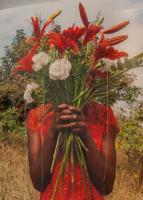 Reflection on the transgenerational dimensions of the notion of memory is, however, of course, much earlier than Hirsch’s proposal. In particular in Holocaust literature, the construction of a memory of the “not-lived”, characteristic of the postmemorial gesture, builds up a model that can be abundantly traced and that, precisely due to the power of the paradigm of confrontation with the Holocaust or the ensemble of studies on violence, trauma and memory, deserves particular attention.
Reflection on the transgenerational dimensions of the notion of memory is, however, of course, much earlier than Hirsch’s proposal. In particular in Holocaust literature, the construction of a memory of the “not-lived”, characteristic of the postmemorial gesture, builds up a model that can be abundantly traced and that, precisely due to the power of the paradigm of confrontation with the Holocaust or the ensemble of studies on violence, trauma and memory, deserves particular attention.
To read
04.05.2019 | by António Sousa Ribeiro
 I believe the society is not yet ready for some things. For example when people come close to caress him, the look of love on their faces changes to pitiness. The fact that one is disabled does not mean they cannot understand what's going on around them. I don't blame people for this matter though they need to realize pitying doesn't help at all.''
I believe the society is not yet ready for some things. For example when people come close to caress him, the look of love on their faces changes to pitiness. The fact that one is disabled does not mean they cannot understand what's going on around them. I don't blame people for this matter though they need to realize pitying doesn't help at all.''
Face to face
04.05.2019 | by Sinem Taş
 'Life's too short to invent problems... It is quite likely that not everything will be the way we want. Everything that happens to us is actually beautiful. All of it! Sadness. sickness, even losing a loved one is beautiful! Cause we learn from these experiences.
'Life's too short to invent problems... It is quite likely that not everything will be the way we want. Everything that happens to us is actually beautiful. All of it! Sadness. sickness, even losing a loved one is beautiful! Cause we learn from these experiences.
Face to face
27.04.2019 | by Sinem Taş
 Or about this faraway socialist family whose stench of betrayal sullies our ideals. Make yourself, with all the others, into a mass of militant workers. Neurotics. Gentrified. You’ve got to walk down the white stripes that cross the Open Space of shuttered hives glistening in the sun: elbowing to keep your place, emphasizing your success to excess. The law of the jungle is the strongest survive.
Or about this faraway socialist family whose stench of betrayal sullies our ideals. Make yourself, with all the others, into a mass of militant workers. Neurotics. Gentrified. You’ve got to walk down the white stripes that cross the Open Space of shuttered hives glistening in the sun: elbowing to keep your place, emphasizing your success to excess. The law of the jungle is the strongest survive.
Mukanda
27.04.2019 | by Joëlle Sambi
 "It had its difficulties of course. There weren't many toy makers in Portugal around that time to start with. Nor were toys of any importance. Just a toy... Which is not the case for me. They all have names, stories. Now I do the job I love every day. I am happy because I do the thing, I love every day. No pressure, no orders and I see happy faces every day. The people that walk in through these doors are special. Cause they know toys are more than just plastic.
"It had its difficulties of course. There weren't many toy makers in Portugal around that time to start with. Nor were toys of any importance. Just a toy... Which is not the case for me. They all have names, stories. Now I do the job I love every day. I am happy because I do the thing, I love every day. No pressure, no orders and I see happy faces every day. The people that walk in through these doors are special. Cause they know toys are more than just plastic.
Face to face
22.04.2019 | by Sinem Taş
 My grandmother's name was Hayriye. It means 'to be full of goodness, kindness’. People live by their name. Grandma truly did. Maybe she wasn't able to shine in on her own life, but she became the flicker that ignited the candle which became the light for different people.
My grandmother's name was Hayriye. It means 'to be full of goodness, kindness’. People live by their name. Grandma truly did. Maybe she wasn't able to shine in on her own life, but she became the flicker that ignited the candle which became the light for different people.
Face to face
10.04.2019 | by Sinem Taş
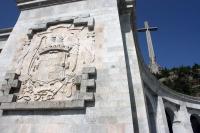 The fact that Franco is buried in sacred land, the Basilica, and his family’s decision to bring the body to Madrid’s Cathedral if he is exhumed from the Valley, a measure they bluntly oppose, has prompted the Government to search unsuccessfully for complicity in the Vatican, scaling up the controversy to a diplomatic realm. The fate of Franco’s body, still today in the Valley, has transformed into a formidable political and memorial arena questioning the ability of Spain’s democracy to defeat once and for all the resilient ghost of its last dictator.
The fact that Franco is buried in sacred land, the Basilica, and his family’s decision to bring the body to Madrid’s Cathedral if he is exhumed from the Valley, a measure they bluntly oppose, has prompted the Government to search unsuccessfully for complicity in the Vatican, scaling up the controversy to a diplomatic realm. The fate of Franco’s body, still today in the Valley, has transformed into a formidable political and memorial arena questioning the ability of Spain’s democracy to defeat once and for all the resilient ghost of its last dictator.
To read
06.04.2019 | by Francisco Ferrándiz
 language embodies the resolutions and contents of its own past as much as its present and future. But language is also a social reality and thus acts as a means of practical communication and by forming subjective awareness. Apart from being one of the basic rights of all human beings (according to the Universal Declaration of Linguistic Rights), using one’s “home language” in social dealings is one of the contradictions arising in the era of globalization.
language embodies the resolutions and contents of its own past as much as its present and future. But language is also a social reality and thus acts as a means of practical communication and by forming subjective awareness. Apart from being one of the basic rights of all human beings (according to the Universal Declaration of Linguistic Rights), using one’s “home language” in social dealings is one of the contradictions arising in the era of globalization.
To read
02.04.2019 | by Inocência Mata
 One hears the intense and physical music of Scúru Fitchádu and it is perceived that it comes from the entrails, populated by a whirlwind of emotions that long people the imaginary of Marcus. Why have not they been patented before? "Every day I think about it," says the 37-year-old musician. "Why did not this come sooner if it always lived within me? Do not know. But glad it came out now. A few years ago maybe it was too soon and I did not have the same kind of answers I'm getting now.
One hears the intense and physical music of Scúru Fitchádu and it is perceived that it comes from the entrails, populated by a whirlwind of emotions that long people the imaginary of Marcus. Why have not they been patented before? "Every day I think about it," says the 37-year-old musician. "Why did not this come sooner if it always lived within me? Do not know. But glad it came out now. A few years ago maybe it was too soon and I did not have the same kind of answers I'm getting now.
Stages
02.04.2019 | by Vítor Belanciano
 Even more important are the studies by Lévy-Strauss; by members of the Latin American “decolonality” group such as Eduardo Viveiros de Castro, Walter Mignolo and Aníbal Quijanol; by anthropologists such as Aparecida Vilaça, Yvone de Freitas Leite, Elisa Loncon Antileo and Pedro Niemeyer Cesarino; and by indigenous leaders such as Ailton Krenac. The latter both denounce the extermination of native languages and also study them, trying to record them as far as is still possible. With this intellectual investment they recover the languages’ memory and, with it, a pre-colonial cultural universe.
Even more important are the studies by Lévy-Strauss; by members of the Latin American “decolonality” group such as Eduardo Viveiros de Castro, Walter Mignolo and Aníbal Quijanol; by anthropologists such as Aparecida Vilaça, Yvone de Freitas Leite, Elisa Loncon Antileo and Pedro Niemeyer Cesarino; and by indigenous leaders such as Ailton Krenac. The latter both denounce the extermination of native languages and also study them, trying to record them as far as is still possible. With this intellectual investment they recover the languages’ memory and, with it, a pre-colonial cultural universe.
To read
30.03.2019 | by António Pinto Ribeiro
 Whether in terms of its officially ensconced denial or the radical geopolitical reformulation of Portugal after decolonization, the Colonial War remains historiographically unresolved. The experience of participation in the war is one of the most repressed and complex, but also one of the most tragic, events of Portuguese contemporary life, and it continues to resonate today.
Whether in terms of its officially ensconced denial or the radical geopolitical reformulation of Portugal after decolonization, the Colonial War remains historiographically unresolved. The experience of participation in the war is one of the most repressed and complex, but also one of the most tragic, events of Portuguese contemporary life, and it continues to resonate today.
To read
30.03.2019 | by Margarida Calafate Ribeiro
 I decided to take photos when I understood that the opinions of my family made no sense anymore. But my mum wouldn't allow me, telling me "girls don't take photos". So I did it unbeknownst to her anyway. I had found a spare camera and I used to leave it at home so that my mum would think I left my camera home...
I decided to take photos when I understood that the opinions of my family made no sense anymore. But my mum wouldn't allow me, telling me "girls don't take photos". So I did it unbeknownst to her anyway. I had found a spare camera and I used to leave it at home so that my mum would think I left my camera home...
Face to face
29.03.2019 | by Sinem Taş
 The work suggests that another person’s perspective, and their particular capacities, affects the inherited vision. This vision, diminished or amplified, can cloud, obscure, or deform the receiving view; but it may at the same time provoke the heir to explore the ways that their perspective belongs neither only to them, nor any longer only to the bequeather. And this question, which starts with recognising this inheritance, can also be the starting point for other visions.
The work suggests that another person’s perspective, and their particular capacities, affects the inherited vision. This vision, diminished or amplified, can cloud, obscure, or deform the receiving view; but it may at the same time provoke the heir to explore the ways that their perspective belongs neither only to them, nor any longer only to the bequeather. And this question, which starts with recognising this inheritance, can also be the starting point for other visions.
To read
23.03.2019 | by Fátima da Cruz Rodrigues
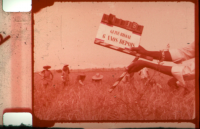 This article reads Amílcar Cabral’s much under-studied early soil science as a body of work not dissociable from his project of liberation struggle against Portuguese colonialism in Guinea-Bissau and Cape Verde. Drawing on research situated within an artistic practice, the article explores the definitions of soil and erosion that Cabral developed as an agronomist, as well as his reports on colonial land exploitation and analysis of the trade economy, to unearth his double agency as a state soil scientist and as a ‘seeder’ of African liberation.
This article reads Amílcar Cabral’s much under-studied early soil science as a body of work not dissociable from his project of liberation struggle against Portuguese colonialism in Guinea-Bissau and Cape Verde. Drawing on research situated within an artistic practice, the article explores the definitions of soil and erosion that Cabral developed as an agronomist, as well as his reports on colonial land exploitation and analysis of the trade economy, to unearth his double agency as a state soil scientist and as a ‘seeder’ of African liberation.
Afroscreen
28.02.2019 | by Filipa César
 Women come together to perform Tufo wearing capulanas and bright-coloured shirts. Their faces are covered with mussiro, a type of facial cream used by Macua women. They tie head wraps and use jewellery, necklaces and bracelets for an extravagant finishing touch.
Women come together to perform Tufo wearing capulanas and bright-coloured shirts. Their faces are covered with mussiro, a type of facial cream used by Macua women. They tie head wraps and use jewellery, necklaces and bracelets for an extravagant finishing touch.
Stages
27.02.2019 | by Hélio Nguane
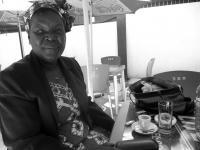 Paulina Chiziane (Majacaze, 1955) is surely one of the most prominent figures of current Mozambican literature, and not just that. She is an essential reference for the country’s feminist movements, a woman who confronted particularly conflictual aspects of African cultures in her literary works with startling intensity, developing themes that no one else wants to hear or discuss, not in the private sphere, much less in the public or political spheres. These are silenced themes, taboos, especially painful, pending and unresolved subjects, such as the Mozambican civil war, women’s rights in polygamy and black magic.
Paulina Chiziane (Majacaze, 1955) is surely one of the most prominent figures of current Mozambican literature, and not just that. She is an essential reference for the country’s feminist movements, a woman who confronted particularly conflictual aspects of African cultures in her literary works with startling intensity, developing themes that no one else wants to hear or discuss, not in the private sphere, much less in the public or political spheres. These are silenced themes, taboos, especially painful, pending and unresolved subjects, such as the Mozambican civil war, women’s rights in polygamy and black magic.
Face to face
25.02.2019 | by Doris Wieser
 The distance between the writer and the traumatic reality about which they write determines the result of literary attempts to convey the experience of violence. Nevertheless, there are similarities between the artistic representations of memory offered by direct witnesses of events and those re-elaborated by their descendants (those we call post-memories).
The distance between the writer and the traumatic reality about which they write determines the result of literary attempts to convey the experience of violence. Nevertheless, there are similarities between the artistic representations of memory offered by direct witnesses of events and those re-elaborated by their descendants (those we call post-memories).
To read
24.02.2019 | by Felipe Cammaert
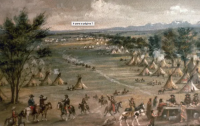 Research finds killing of native people indirectly contributed to a colder period by causing deaths of around 56 million by 1600. European colonization of the Americas resulted in the killing of so many native people that it transformed the environment and caused the Earth’s climate to cool down, new research has found. Settlers killed off huge numbers of people in conflicts and also by spreading disease, which reduced the indigenous population by 90% in the century following Christopher Columbus’s initial journey to the Americas and Caribbean in 1492.
Research finds killing of native people indirectly contributed to a colder period by causing deaths of around 56 million by 1600. European colonization of the Americas resulted in the killing of so many native people that it transformed the environment and caused the Earth’s climate to cool down, new research has found. Settlers killed off huge numbers of people in conflicts and also by spreading disease, which reduced the indigenous population by 90% in the century following Christopher Columbus’s initial journey to the Americas and Caribbean in 1492.
To read
22.02.2019 | by Oliver Milman